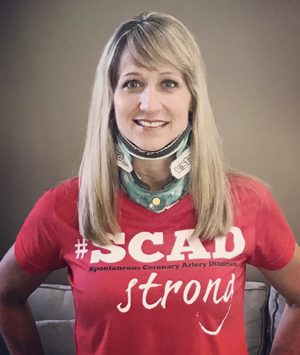

Karen Glugla was like every working mother – balancing the needs of her family, her job and her personal interests when the unexpected happened. She was only in her 40s when the Clinical Occupational Therapy Specialist had a heart attack.
She recovered. But then she had a second attack. It was during her visit to the emergency room when a well-informed doctor told Glugla that she likely had what is known as SCAD or Spontaneous Coronary Artery Dissention, a condition that would change her life forever.
Today, the mother of four is still working, dancing with her children and enjoying life. But she wants other women to know about SCAD, the possibilities of heart attack and the importance of taking care of your health, no matter what your age or gender.
Rare but not unusual
Some background: Glugla, 46 was diagnosed with Spontaneous Coronary Artery Dissection (SCAD) in July 2014 when she suffered her first attack. She had no prior diagnosis of the condition. SCAD is a rare form of heart disease that transpires when a sudden tear occurs within the layers of one or more arteries to the heart. This tear blocks blood flow and causes a heart attack.
“It literally breaks your heart,” Glugla says. “The first time it happened to me they said I had had a spasm. It came out of nowhere. … Then, a few years later when I had the second attack, there was a doctor in the ER who knew what to look for when he suspected it was SCAD.”
It turns out that doctor had read an article on SCAD, Glugla says. In hindsight, she believes her condition was there all along only few doctors know how to identify it. Many women in her family have had heart attacks or died in the 40s and 50s. Glugla says the symptoms are so much like a regular heart attack that few women know to ask their doctors about it or look for signs.
SCAD is the no.1 cause of heart attacks in women under age 50, as well as the leading cause of a heart attack in women who are pregnant/new mothers. Glugla says she wants to work with local hospitals and OB/GYNs to make sure they know about SCAD and can look for it in their patients, especially women who are having babies as older moms.

Still living
Instead of letting her illness get her down, Glugla continues her 17-year career at DMC’s Children’s Hospital of Michigan as a Clinical Occupational Therapy Specialist. She also volunteers at the Ann Parsley School of Dance in Detroit teaching various forms of dance; working with a dozen sick children, whose illnesses range from cerebral palsy to muscular dystrophy.
Every day, Karen teaches dance classes to help these kids forget their ailments and enjoy dance and life. Right now, she’s preparing the kids for the spring recital. Many of her friends and her daughter help with these classes, including three of her colleagues from the DMC as well as substitutes who volunteer with her.
“My heart feels the love,” Glugla says. “I have to keep going. … I am aware (of SCAD) but not scared.”




